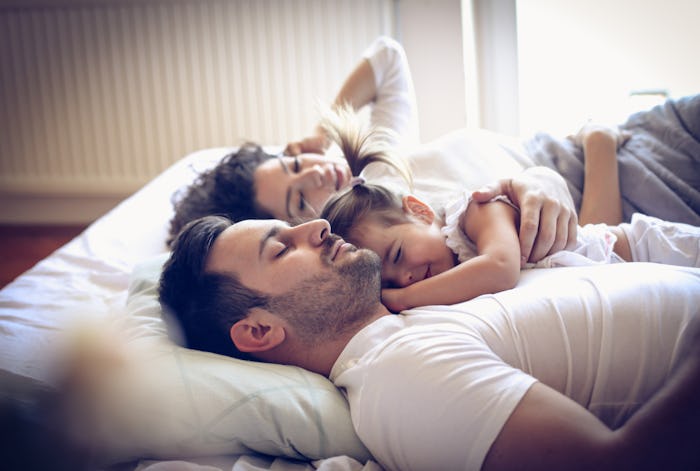Life

Here Are The Ways Fall Will Affect Your Sleep, & How You Can Manage
Reliably, each fall initiates another round of sleep wars in our house. Without noticing it, the nights imperceptibly get a little longer and everyone takes a just a few extra minutes to creep out of bed, and then the clocks fall back and everyone is up an hour earlier to lurk like ghouls before school or work. Seasonal sleep changes are our bodies way of adjusting to the year's changing amount of sunlight, but how fall is going to affect your sleep might be a bigger deal than you think.
According to Harvard Medical School's Healthy Sleep program, light is one of the most important factors that affect healthy sleep. Our internal clock, which helps our body distinguish between night and day, and sleep and wakefulness, relies on special light sensitive cells in our retina and our body rhythms adjust accordingly. Starting with the Fall Equinox this Saturday, Sept. 22, our hours of daylight will be equal to nighttime and will steadily decrease until Winter Solstice, meaning big changes to our sleep patterns will be on the way.
The biggest change is that decreasing amounts of sunlight result in higher amounts of melatonin and less vitamin D, a necessary component of sleep regulation, says Janet K. Kennedy, PhD, a clinical psychologist and founder of NYC Sleep Doctor. You'll probably find that you're a bit sleepier — and maybe moodier— until your body adjusts to less daylight.
"Shorter daylight hours lead to greater melatonin production. That can be good for sleep quality and duration," she writes in an email to Romper. "However, high levels of melatonin can contribute to depressed mood/seasonal affective disorder. And decreased production of vitamin D with less sun exposure can disrupt sleep and lead to mood changes."
Compounding the problem is "falling back" from Daylight Saving Time, which falls on Nov. 4 this year. Often we think we'll be getting an extra hour of sleep, but according to Harvard Medical School it doesn't actually happen. One study found that for the following week, participants had a difficult time falling asleep, would wake up earlier, and had less sustained sleep. People who were "short sleepers" — those who naturally average 7.5 hours or fewer hours of sleep per night — and early risers suffered the most. However, Dr. Kennedy says people tend to have an easier time falling back than springing forward.
"It can take about a week for the body to adjust to DST," she says. "However, it's really springtime DST that is most disruptive because the loss of sleep makes people more prone to accidents and even adverse health events, such as heart attacks. Fall DST is less disruptive, unless of course you have children who will be waking up an hour early while they adjust."
Luckily, Dr. Kennedy says kids tend to sleep really well in the fall and winter once they make the adjustment. The key, however, lies in making sure they get enough activity during the day so their bodies continue distinguishing between night and day — not always an easy thing to do if you live in a blustery and dark locale.
"For older kids and toddlers, sleep can take a hit when they can't get outside during the day," she writes. "It's important to make sure they get enough activity during the day to create contrast between day and night and regulate the circadian rhythm."
Should you find that you become more lethargic the deeper into winter you get, it's the lack of light that prevents the production of melatonin from shutting down, Dr. Kennedy says. The best way to combat your lack of energy is to avoid taking naps and maintain a regular sleep schedule despite your body's desire to hibernate.
"It's hard to get out of bed when it's cold and dark, but it's really important," she writes. "Otherwise, you can end up feeling groggy and lethargic during the day and having sleep problems at night."
While you may have to fight with your body a bit, the easiest solution to maintaining a reasonable sleep schedule is to get just enough light to regulate vitamin D levels, which also fends off the overproduction of melatonin. In addition to a strict sleep schedule, Dr. Kennedy suggests that a light box would be helpful for people who can't get outside for the recommended amount of time or live in regions that don't have enough sunlight to produce sufficient levels of vitamin D. With a little bit of effort, you and your family can overcome a serious case of the sleepies and be back on track in just a few weeks.